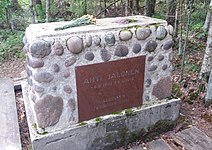Nousiainen
Nousiainen
Nousis | |
|---|---|
Municipality | |
| Nousiaisten kunta Nousis kommun | |
 Nousiainen Church | |
 Location of Nousiainen in Finland | |
| Coordinates: 60°36′N 022°05′E / 60.600°N 22.083°E | |
| Country | |
| Region | Southwest Finland |
| Sub-region | Turku sub-region |
| Charter | 1867 |
| Government | |
| • Municipal manager | Juhani Kylämäkilä |
| Area (2018-01-01)[1] | |
• Total | 199.55 km2 (77.05 sq mi) |
| • Land | 198.93 km2 (76.81 sq mi) |
| • Water | 0.62 km2 (0.24 sq mi) |
| • Rank | 263rd largest in Finland |
| Population (2024-10-31)[2] | |
• Total | 4,664 |
| • Rank | 175th largest in Finland |
| • Density | 23.45/km2 (60.7/sq mi) |
| Population by native language | |
| • Finnish | 95.8% (official) |
| • Swedish | 0.8% |
| • Others | 3.4% |
| Population by age | |
| • 0 to 14 | 19% |
| • 15 to 64 | 60.3% |
| • 65 or older | 20.6% |
| Time zone | UTC+02:00 (EET) |
| • Summer (DST) | UTC+03:00 (EEST) |
| Climate | Dfb |
| Website | www.nousiainen.fi |
Nousiainen (Finnish: [ˈnou̯siˌɑi̯nen]; Template:Lang-sv) is a municipality of Finland. It is located in the Southwest Finland region, 20 kilometres (12 mi) from Turku along Highway 8 (E8).[6] The Finnish-speaking municipality has a population of 4,664 (31 October 2024)[2] and covers an area of 199.55 square kilometres (77.05 sq mi) of which 0.62 km2 (0.24 sq mi) is water.[1] The population density is 23.45 inhabitants per square kilometre (60.7/sq mi).
There are two Natura 2000 sites in Nousiainen: the Kurjenrahka National Park and the Rehtisuo Raised Bog.[7]
History
Nousiainen was an "ancient parish" (a unit of social organization) before Swedish rule.
Nousiainen was the first seat of the bishop of Finland until the early 13th century, when the seat was shifted to Koroinen, nowadays a part of Turku. It remained, however, a place of pilgrimage throughout the Middle Ages.[8] The coat of arms of Nousiainen depicts Bishop Henry and Lalli.
Nousiainen was mentioned in 1232 as de Nousia and in 1234 as Nosis. Its name is derived from a pre-Christian Finnish personal name Nousia, still the name of some 10-20 men in 2022.[9] Even after the bishopric was moved to Koroinen, Nousiainen was still an important pilgrimage site until the reformation, as it was thought that bishop Henry was buried there.
The village of Nummi, the current administrative seat of the municipality, was mentioned in 1380 as Nummusby. Court sessions for Nousiainen, Masku and Santamala were held there at the time. By 1556, Nummi was the largest village in Nousiainen.[10]
Economics
Agriculture has always been Nousiainen's most significant industry. Significant employers also included Teleste Oyj's electronics factory, which, however, has already closed down in the municipality. In 2015, the municipality had 1,009 jobs; of these, 11% were in primary production (agriculture, forestry and fishery), 72% in services and 15% in processing.[11] The companies that paid the most corporate tax in 2016 were FCR Finland, which operates in the shipbuilding industry, Mynämäen-Nousiaisten Osuuspankki and Maalausliike Helin.[12]
Culture
Food
Sweetened potato casserole, or imelet perunloora in the local dialect, was named the traditional parish dish of Nousiainen in the 1980s.[13]
Notable people
- Mikko Rantanen (born 1996), professional ice hockey player for the Colorado Avalanche of the National Hockey League (NHL)
Gallery
-
A grain processing facility by the Turku–Uusikaupunki railway in Nousiainen
-
European route E8 in Nousiainen
-
The memorial of Ahti Jalonen (1901–1918), a young victim of the White Terror during the Finnish Civil War
-
Emovaha glacial erratic in Nousiainen
See also
References
- ^ a b "Area of Finnish Municipalities 1.1.2018" (PDF). National Land Survey of Finland. Retrieved 30 January 2018.
- ^ a b "Finland's preliminary population figure was 5,635,560 at the end of October 2024". Population structure. Statistics Finland. 2024-11-19. ISSN 1797-5395. Retrieved 2024-11-22.
- ^ "Population growth biggest in nearly 70 years". Population structure. Statistics Finland. 2024-04-26. ISSN 1797-5395. Retrieved 2024-04-29.
- ^ "Population according to age (1-year) and sex by area and the regional division of each statistical reference year, 2003–2020". StatFin. Statistics Finland. Retrieved 2 May 2021.
- ^ a b "Luettelo kuntien ja seurakuntien tuloveroprosenteista vuonna 2023". Tax Administration of Finland. 14 November 2022. Retrieved 7 May 2023.
- ^ Opaskartta - Turun karttapalvelu
- ^ Natura 2000 -alueet - Varsinais-Suomi - Ympäristö (in Finnish)
- ^ David Kirby, A Concise History of Finland (Cambridge, 2006), p. 7.
- ^ "Digi- ja väestötietovirasto". verkkopalvelu.vrk.fi (in Finnish). August 15, 2022. Retrieved August 20, 2022.
{{cite web}}: CS1 maint: url-status (link) - ^ "SuomalainenPaikannimikirja_e-kirja_kuvallinen.pdf" (PDF). kaino.kotus.fi (in Finnish). p. 293+294. Retrieved August 19, 2022.
{{cite web}}: CS1 maint: url-status (link) - ^ Kuntien avainluvut - Statistics Finland (in Finnish)
- ^ YLE: Alueen Nousiainen yhteisöverotiedot (in Finnish)
- ^ Jaakko Kolmonen: Kotomaamme ruoka-aitta: Suomen, Karjalan ja Petsamon pitäjäruoat, p. 26. Helsinki: Patakolmonen Ky, 1988. (in Finnish)
External links
 Media related to Nousiainen at Wikimedia Commons
Media related to Nousiainen at Wikimedia Commons- Municipality of Nousiainen – Official website







